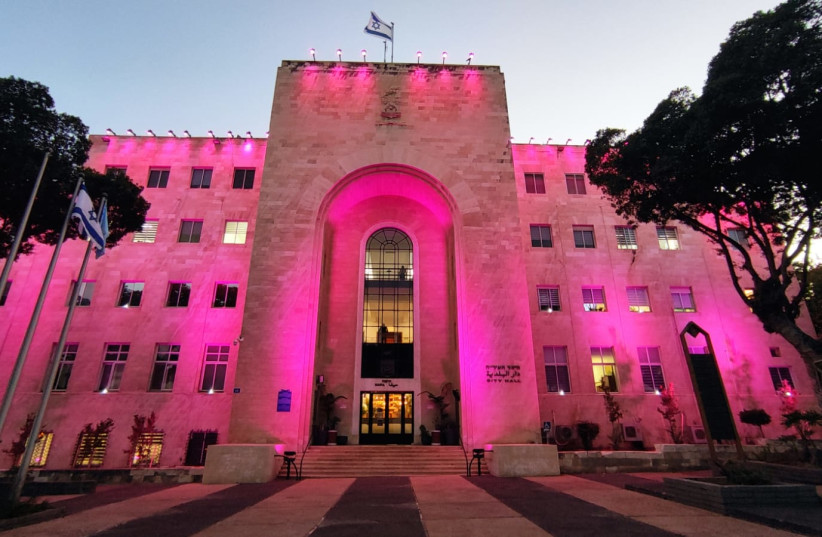Israelis like to end a conversation between friends and even strangers with the parting wish: “Ha’ikar habriut!” – the most important thing is good health. This month, Breast Cancer Awareness Month, the saying is even more pertinent.
The month is being marked globally with many different initiatives from lighting up buildings in the color pink to wearing pink ribbons, fundraisers for breast cancer research and support, and increased public information campaigns.
As part of Breast Cancer Awareness month, the Israeli Health Ministry released statistics concerning the disease. As reported by Post health reporter Judy Siegel-Itzkovich, there was some good news in the latest figures published, relating to the year 2020.
There has been a drop in the number of Israelis diagnosed with breast cancer and an increase in the percentage of those diagnosed at an early stage, according to the ministry’s figures. In 2020, 5,384 Israelis were diagnosed with a breast tumor.
About a fifth of all cancer deaths in women are as a result of invasive breast cancer. In 2020, 1,060 women died in Israel from invasive breast cancer, a drop from 2019 when 1,085 women died.

Between the years 1996 to 2020, there was a significant drop in mortality trends from invasive breast cancer among Jewish women, along with stable figures relating to Arab Israeli women. Israel is in 26th place in the world in the incidence rate of the disease but in 71st spot in the death rate from it, Siegel-Itzkovich noted – an improvement in the mortality rate compared to the previous year.
In additional positive news, the prognosis for those who have been diagnosed with breast cancer has improved. According to the ministry figures, the five-year survival rate from breast cancer among women diagnosed between 2009 to 2015 is high: 89.4% among Jewish women and 84.3% among Arab women in Israel.
The average age at diagnosis in 2020 was 59.5 among Jewish women, while among women in the Arab community, the average age of diagnosis was 55 in 2019 and 51.6 in 2020.
Much of the credit for the drop in mortality rates goes to the early detection and treatment of the disease. The Israel Cancer Association should be praised for its awareness campaign encouraging mammograms. Israelis also benefit from easy free access to life-saving examinations via the public health system.
Evidence of the effectiveness of the screening program can be seen in the increase in the proportion of women who are diagnosed at an early stage of the disease, raising their chances for survival and recovery.
Health Ministry recommends mammograms
The Health Ministry recommends that women aged 50 to 74 undergo a routine mammogram once every two years, and those aged 40 and older who are at increased risk of the disease (due to a first-degree family member diagnosed with breast cancer, for example) have an annual mammogram check-up. The examination, while not pleasant, can save lives and is preferable to undergoing harsher treatments later due to delayed detection.
Incidentally, although breast cancer is thought of as a “women’s disease,” men are not immune. In 2020, 53 men in Israel were diagnosed with the disease (one in 100 cases), the vast majority of them men over the age of 50. In fact, men might be particularly at risk due to a lack of awareness. They are more likely to ignore symptoms, which include: a lump in the breast; changes in the shape of the breast or nipple; a discharge from the nipple; swollen lymph glands in the armpit; and changes to the skin on the breast, among other signs.
Sadly, most readers probably know someone who succumbed to breast cancer – a relative, a friend, a colleague, or a neighbor. Nothing can bring that person back to life, but raising awareness of the disease is a fitting way to commemorate their memory as well as helping save the lives of others. It also helps let those fighting the disease know that they are not alone and there are support systems available.
As important as Breast Cancer Awareness month is, the disease does not abide by the calendar. Breast cancer awareness that is raised in October must be maintained every day and every month of the year. Screening saves lives. Think pink!
